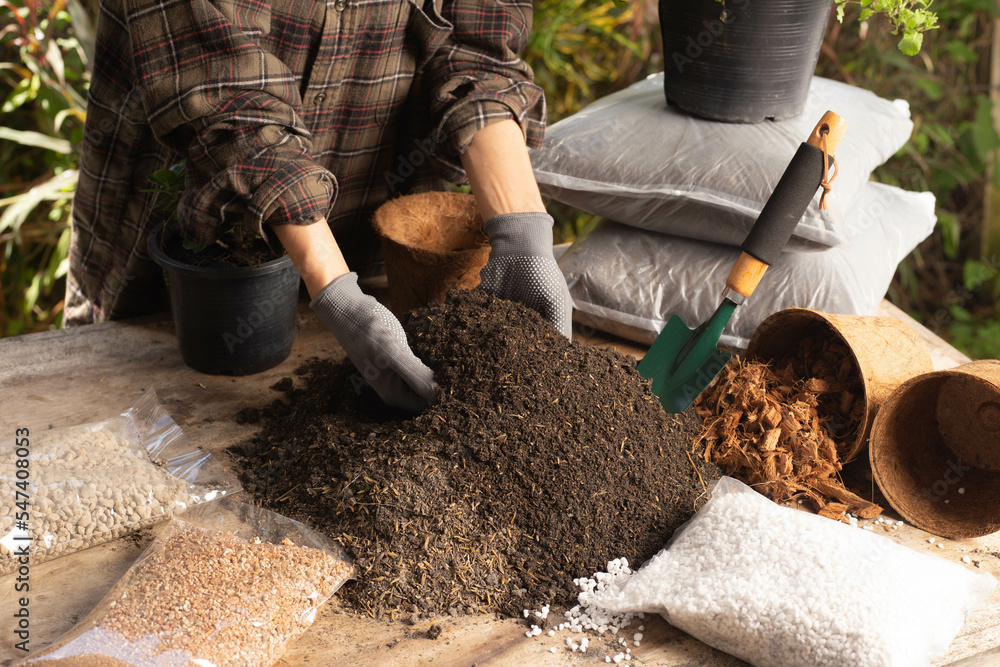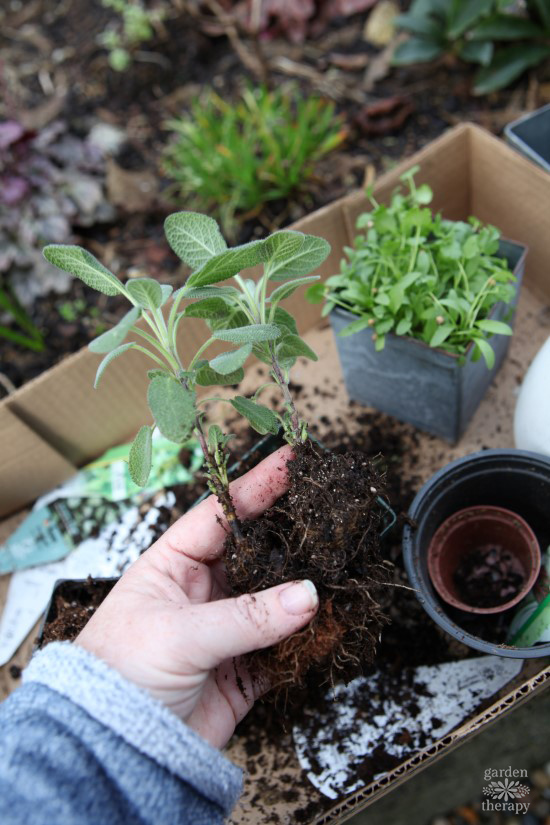A plentiful stock of herbs at your disposal is ideal for the at-home chef, amateur herbalist, or skincare enthusiast. But to get an abundant amount of herbs, it all begins with the soil. Here’s how to get the best soil for herbs using organic ingredients and nutrients!
Pretty soon after I started gardening, I turned to herbs. They’ve been a central part of my garden, as I use them for cooking as well as their herbal and healing properties. You can have so much plant power growing in your backyard!
I get a lot of questions about growing herbs, as more and more people start adding perennial and annual herbs to their gardens and landscapes. So, let’s talk about all things soil.
Whether you’re looking to grow perennial or annual herbs, in the ground or in containers, or outside or indoors, I’ve got all your soil questions answered!
Having a kitchen garden filled with fresh herbs and vegetables right outside your backdoor is one of life’s simple pleasures. The scent of basil, rosemary, and mint wafting through the air as you brush by the plants is downright heavenly. And being able to snip off a few sprigs to toss into dinner or harvest ripe, juicy tomatoes and peppers just minutes before eating is utter bliss.
But in order to grow thriving container herbs and vegetables, you need to start with the right potting soil. Not all potting mixes are created equal when it comes to container gardening. The soil needs to have certain properties to support the best growth of herbs and vegetables in pots and planters.
In this article, we will cover everything you need to know to choose the ideal potting soil for your edible container garden
What to Look for in Potting Soil for Container Herbs and Vegetables
There are several key factors to evaluate when selecting a potting mix for growing herbs and veggies in containers
-
Drainage – Excellent drainage is crucial to prevent soggy soil and root rot. Look for lightweight mixes with ingredients like perlite, vermiculite, coir, or sand.
-
Moisture retention – While drainage is important the soil should also hold some moisture so roots don’t dry out too quickly. Peat moss and coco coir help retain moisture.
-
Nutrients – The soil needs nutrients to feed plants but avoid mixes with very high fertility that can burn tender roots and leaves. Seek balanced levels of nitrogen, phosphorus, and potassium.
-
Organic matter – Ingredients like compost, coir, and worm castings provide organic matter to nourish plants.
-
pH level – Most vegetables and herbs prefer a slightly acidic pH between 6.0-6.8.
-
Soilless – A sterile soilless mix prevents soil-borne diseases.
When searching for the perfect potting mix, be sure to read the ingredients on the bag or description online. Blends containing a mix of peat moss, perlite, vermiculite, coconut coir, and compost tend to provide the right balance of drainage, moisture retention, and nutrients for container gardening.
5 Recommended Potting Soils for Herbs and Vegetables
To help narrow down the choices, here are 5 excellent potting soils for growing herbs and vegetables in containers:
1. Miracle-Gro Moisture Control Potting Mix
- Contains fertilizer to feed plants up to 6 months
- Peat moss and perlite provide moisture control
- Helps prevent over and under-watering
2. Espoma Organic Potting Mix
- Made with coconut coir, peat, perlite, and worm castings
- Has organic fertilizers like alfalfa and fish bone meal
- Great choice for organic gardening
3. FoxFarm Ocean Forest Potting Soil
- Loaded with organic nutrients including bat guano
- Fast draining and lightweight
- Contains mycorrhizae fungi to aid nutrient absorption
4. Miracle-Gro Performance Organics All Purpose In-Ground Soil
- Blended with compost, humus, and manure for moisture retention
- Feeds up to 3 months
- Formulated for all garden vegetables and herbs
5. Black Gold All-Purpose Potting Soil
- Has controlled-release fertilizer
- Good moisture retention ability
- Affordable option suitable for all container plants
No matter which brand or blend you choose, be sure to read the label to ensure it’s formulated for edible plants. Some potting mixes contain chemical additives or fertilizers that are unsafe for vegetables and herbs. An organic, all-natural potting soil is your best bet for herb and veggie containers.
Tips for Using Potting Soil with Container Herbs and Vegetables
Follow these tips to get the most out of your potting mix:
-
Always start seeds and cuttings in a seed starting mix then transplant into potting soil once established. Seed starting mixes are extra light and airy.
-
Add a thin layer of gravel at the bottom of containers to improve drainage.
-
Monitor moisture levels carefully. Herbs and veggies need consistent moisture but not permanently soggy or bone dry soil.
-
Fertilize container plants more often than in-ground plants – every 2-3 weeks with a diluted liquid fertilizer.
-
Group plants with similar light and water needs on the same watering schedule.
With a quality potting soil that drains well and provides nutrients, your container herb and vegetable garden will thrive all season long. Paying attention to the unique needs of herbs vs. vegetables when selecting a potting mix will ensure gardening success.
Frequently Asked Questions about Potting Soil for Herbs and Vegetables
What is the best potting soil for herbs and vegetables?
The ideal potting soil contains a mix of organic matter and inorganic materials to provide nutrients, structure, and drainage. Key ingredients are peat moss, perlite, vermiculite, sand, and compost. Aim for a mix designed specifically for edible container plants.
Is it okay to plant herbs in regular potting soil?
Regular potting soil works fine for most culinary herbs as long as it drains well and has a balanced nutrient content. Heartier herbs like rosemary and thyme prefer quick-draining sandy mixes. More delicate herbs do best in soil with high organic matter to retain moisture.
Can you use Miracle-Gro potting soil for vegetables?
Yes, Miracle-Gro potting soils are suitable for growing vegetables as they contain the necessary nutrients. Look for their mixes formulated specifically for fruits, vegetables, and herbs to get the right blend.
What herbs should not be potted together?
Avoid planting strong scented herbs like mint, basil, and oregano together as they will compete. Also don’t combine herbs with different water and nutrient needs like rosemary and cilantro which have opposite preferences.
Is potting soil better than garden soil for containers?
Potting mixes are better suited for containers than garden soil. They are lightweight and airy to allow drainage, unlike compact garden soil. Potting mixes also provide balanced nutrients while garden soil tends to be depleted.
How often should you fertilize herbs in containers?
Container herbs need more frequent fertilizing than in-ground plants – usually every 2-3 weeks. Use a diluted liquid fertilizer formulated for herbs and vegetables. Slow-release granular fertilizer can be mixed into potting soil before planting.
What is the best potting mix for indoor herb gardens?
Look for lightweight, fast-draining mixes like those containing coco coir for indoor herbs. Add perlite or vermiculite to improve drainage and air pockets. As containers dry out fast indoors, incorporate peat moss or compost to help retain moisture.
Conclusion
Choosing the right potting soil is one of the best things you can do to ensure success growing herbs and vegetables in containers. Look for soilless mixes blended with organic matter, nutrients, and water-retaining ingredients like peat and coco coir. Read labels closely and avoid chemical additives. With the perfect potting mix your container herb and veggie garden will thrive!

Outdoor Herbs in Containers
If you’re planting an outdoor container herb garden, you will want an all-purpose potting mix. It will have more nutrients and be able to retain moisture for potted herbs.
Here is my go-to peat-free potting mix:

What’s the Best Potting Soil for Outdoor Herbs?
Outdoor herbs will grow in the topsoil of your gardening beds, which is the top foot or so of soil. Like most plants, the best soil for herbs is rich with lots of nutrients. The soil should be moist, meaning it can retain water well. Lastly, it needs to be well-draining, allowing excess water to drain out, and it isn’t soggy.
If you have hard clay soil, you may need to improve drainage. Add some gravel or sand and mix in some compost or other organic material.
To improve your top layer of soil, you’ll want to look for garden soil designed for in-ground plants. This is heavy and dense and usually too compact for container plants.
